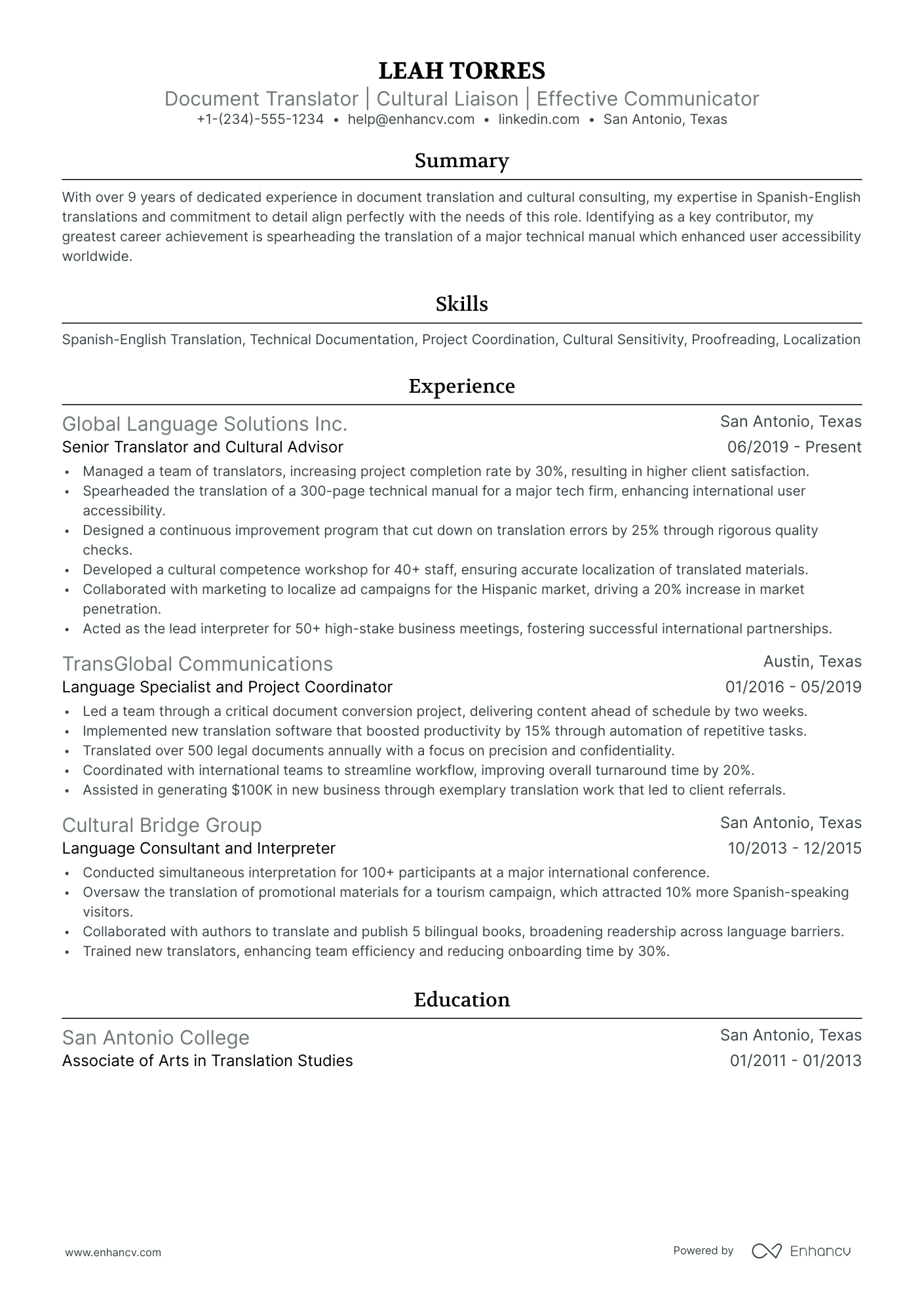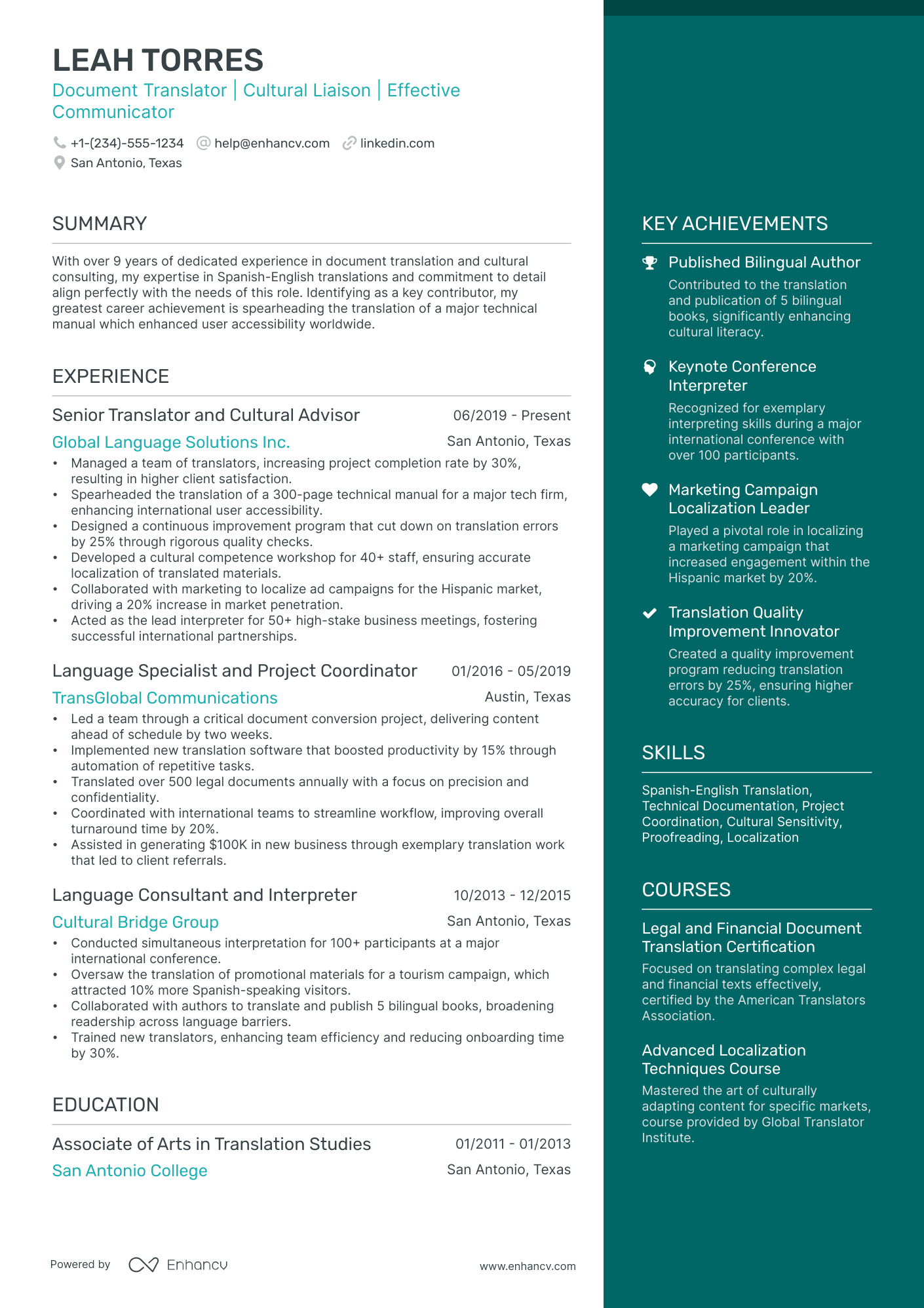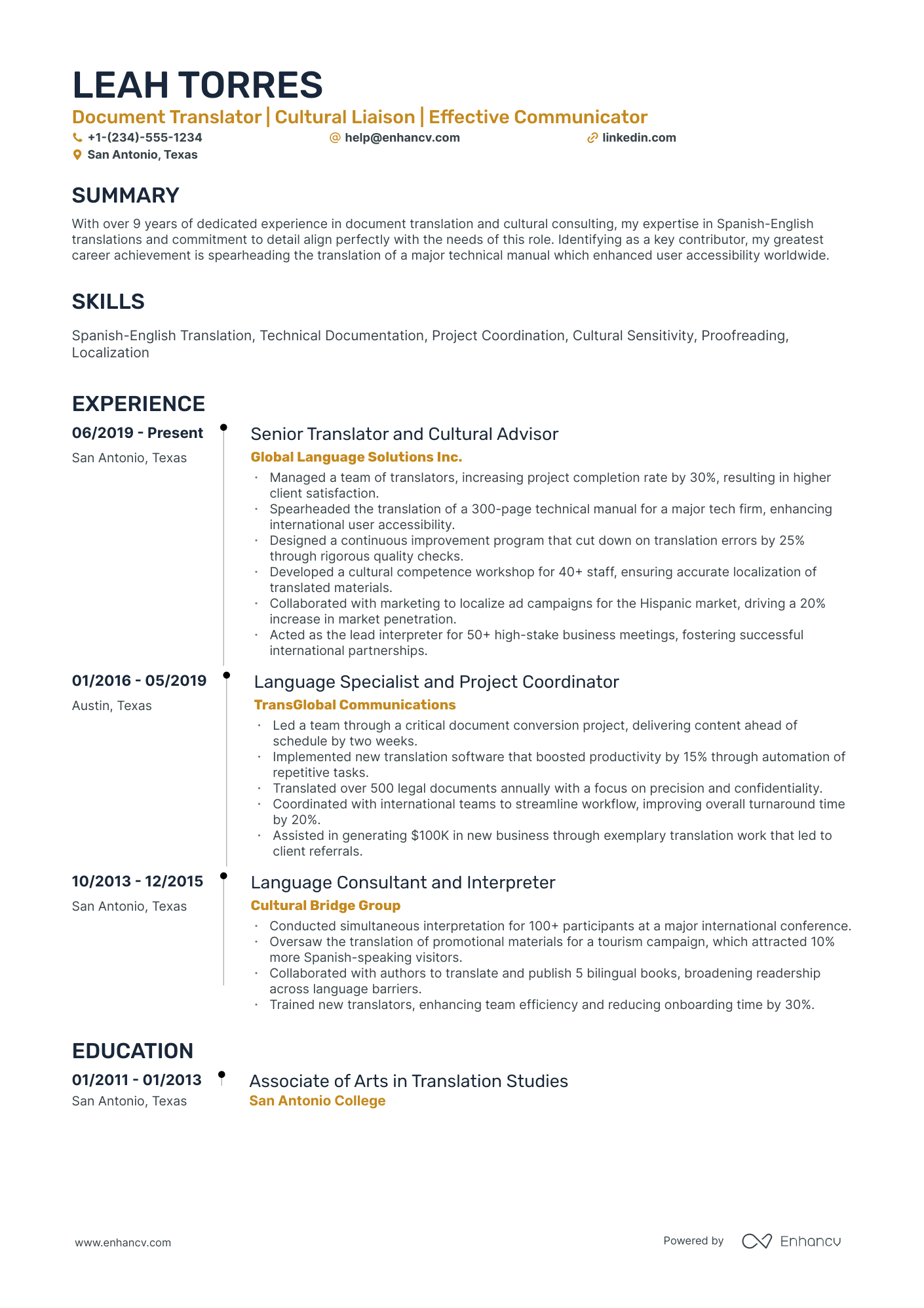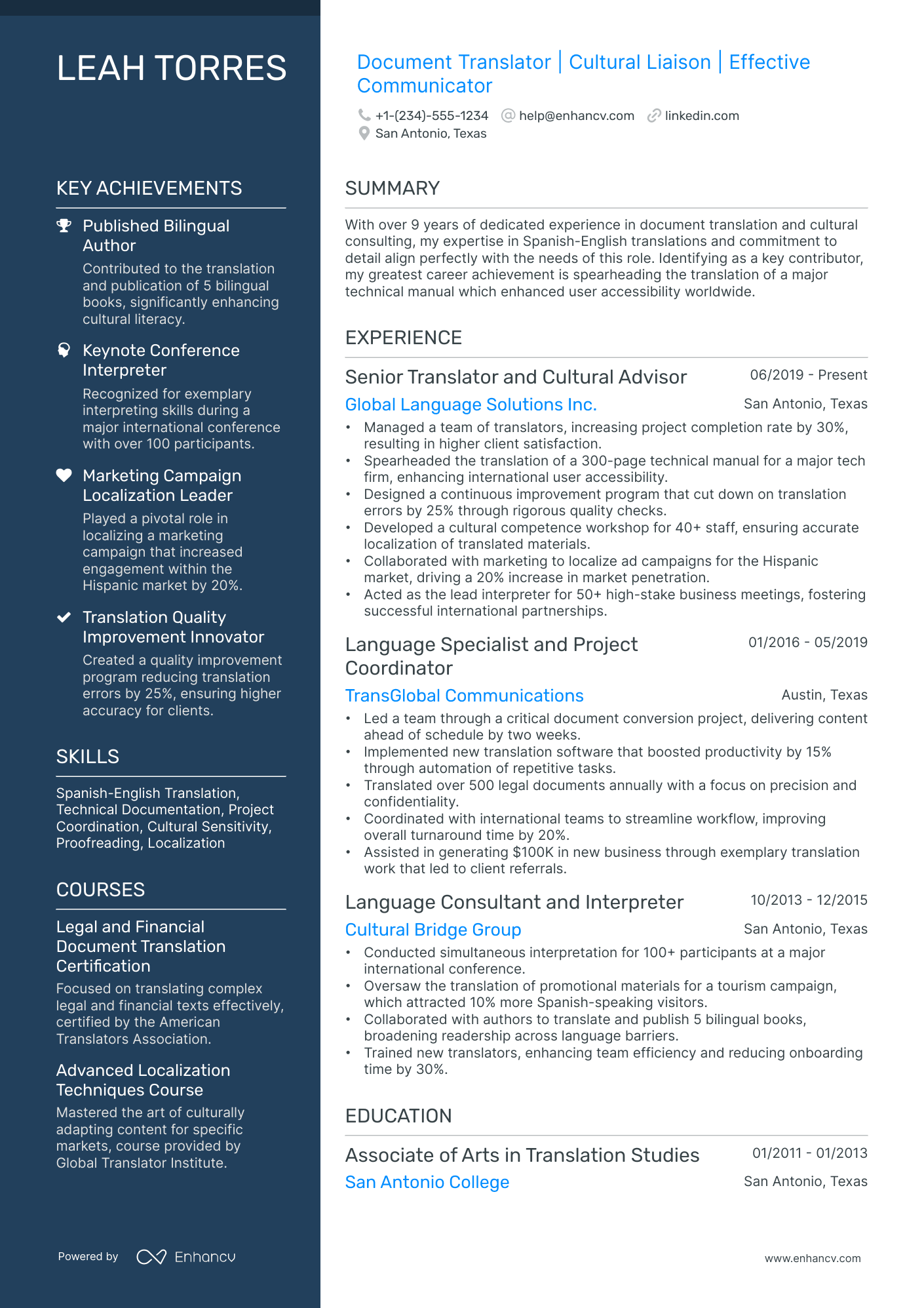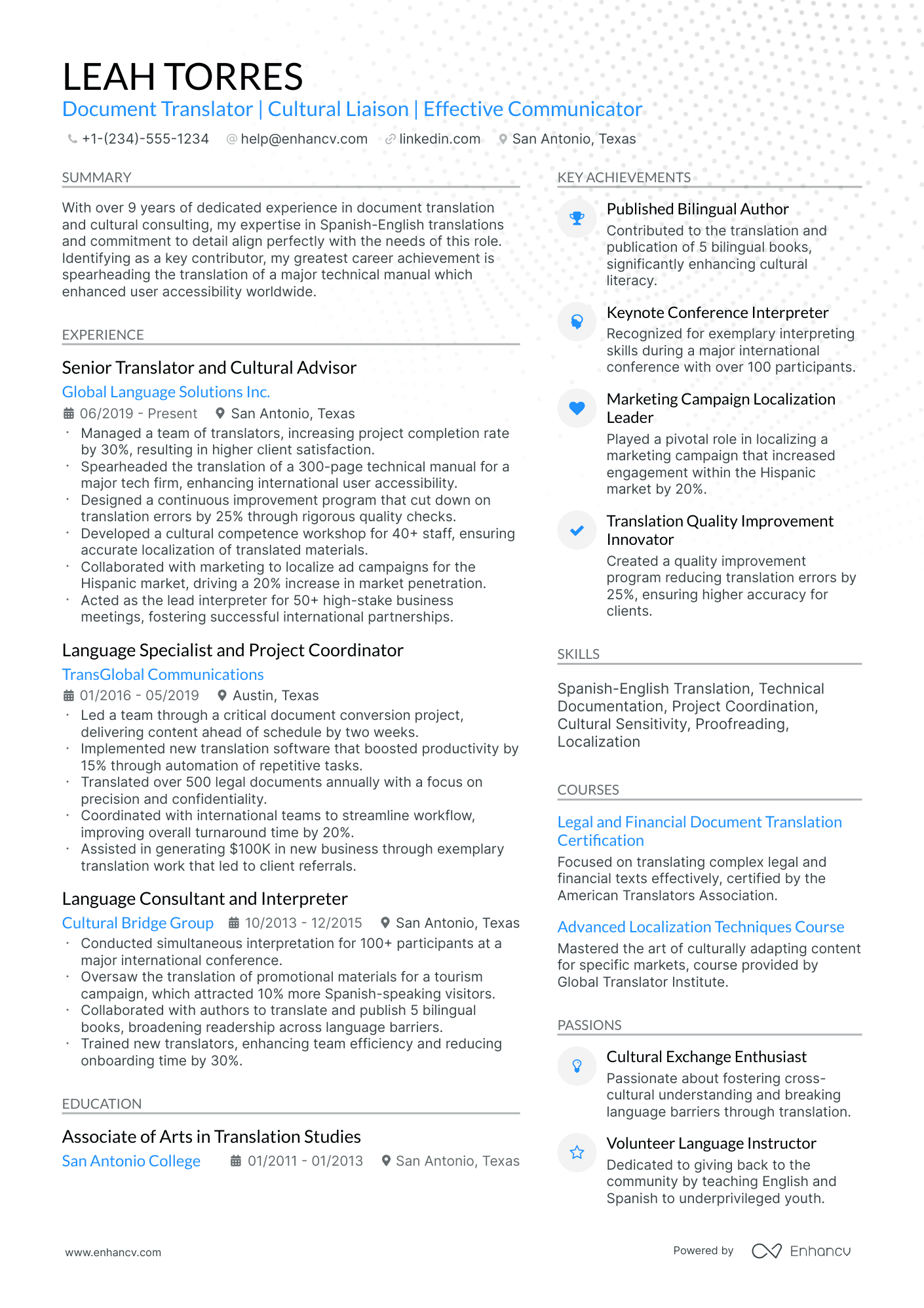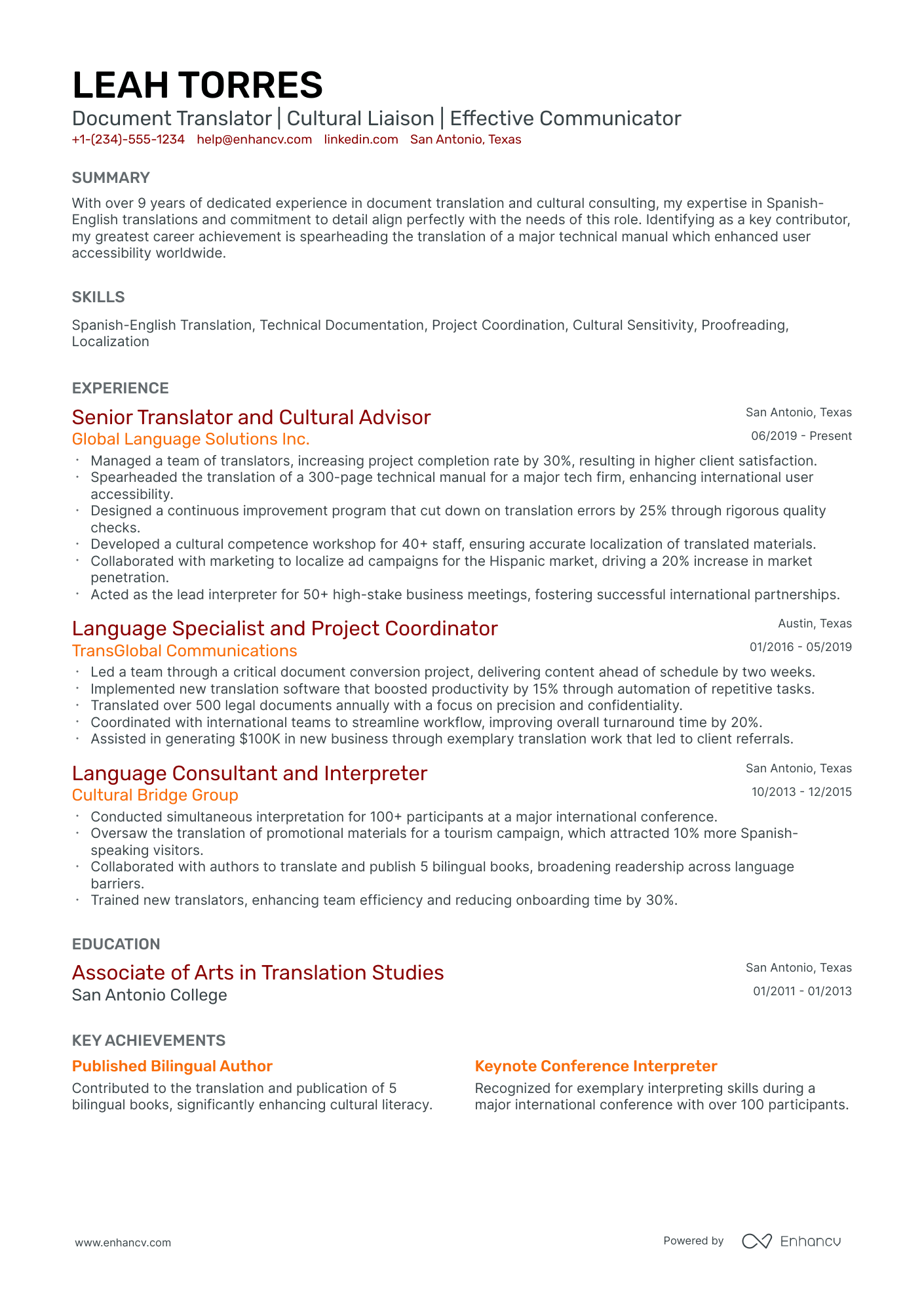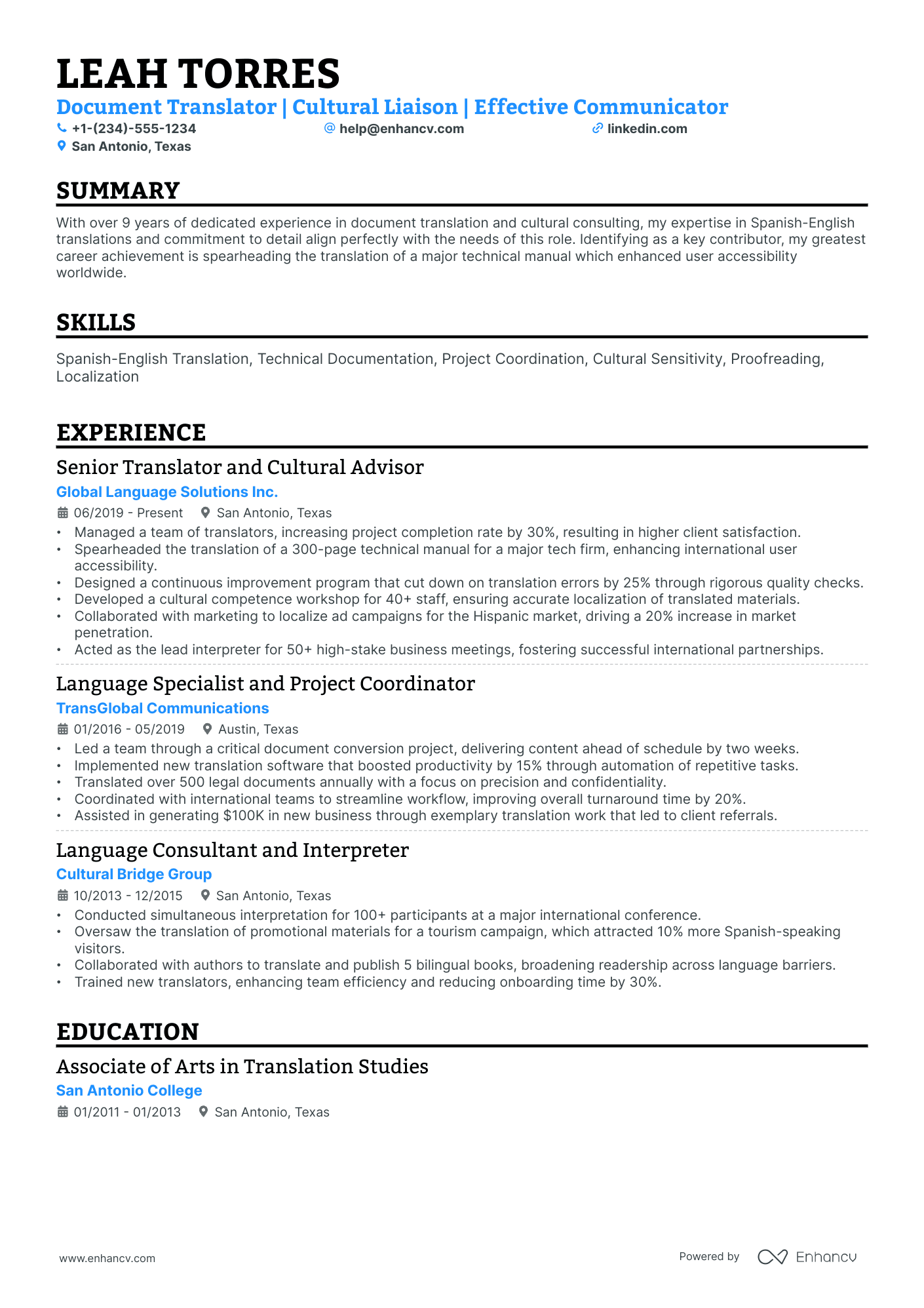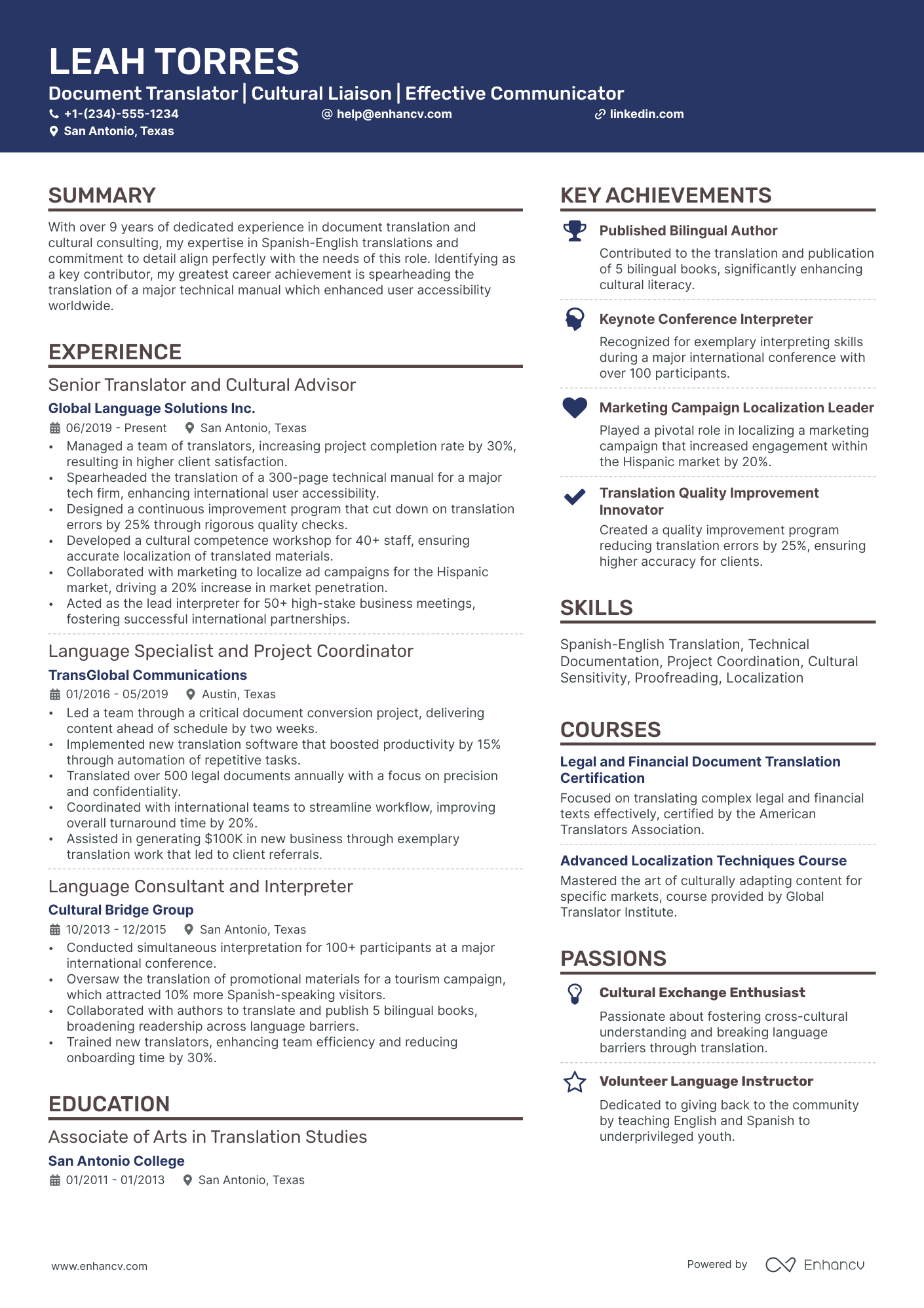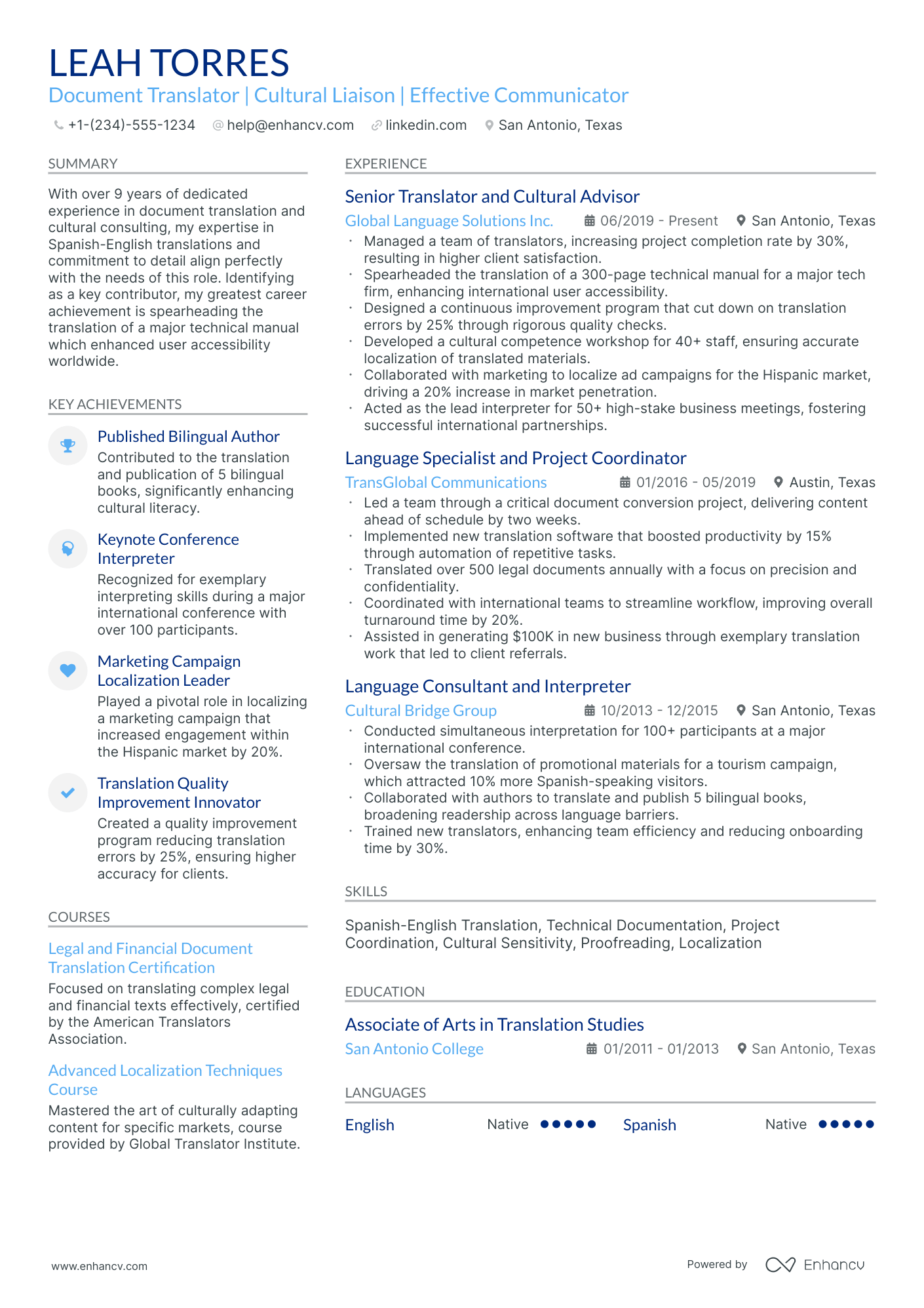As a Spanish translator, finding the right balance of showcasing your linguistic skills and your industry-specific expertise can be a daunting resume challenge. Our guide provides tailor-made strategies to help you emphasize both your translation proficiency and specialized knowledge, ensuring your resume stands out to potential employers.
- The most effective Spanish translator resume samples, reflecting on experience and skills.
- +10 simple, yet impactful methods to tailor your Spanish translator resume to the job advert.
- Using your professional achievements as the North Star to your unique value as a Spanish translator candidate.
- 'No one cares about your education nowadays …' Let's prove this statement wrong with the best-kept industry secrets to your education and certifications.
If the Spanish translator resume isn't the right one for you, take a look at other related guides we have:
Creating the best Spanish translator resume format: four simple steps
The most appropriate Spanish translator resume format is defined by precision and a systematic approach. What is more, it should reflect upon how your application will be assessed by recruiters. That is why we've gathered four of the most vital elements to keep in mind when designing your resume:
- It's all about presenting how your experience or skills align with the job. Use the reverse-chronological resume format , if your expertise is relevant to the Spanish translator role. Otherwise, select the functional skill-based resume format or the hybrid resume format to shift the focus to your skill set.
- Resume header - make sure you've filled out all relevant (and correct) information, like your contact details and link to your portfolio.
- Resume length - unless you've over a decade of applicable expertise in the field, stick with a one-page resume format. If you'd like to present more of your professional experience, go up to two pages.
- Resume file - submit your Spanish translator resume in a PDF format to ensure all information stays in the same place.
Your resume should match the market – Canadian applications, for instance, may use a different layout.
Upload & Check Your Resume
Drop your resume here or choose a file. PDF & DOCX only. Max 2MB file size.
PRO TIP
Mention specific courses or projects that are pertinent to the job you're applying for.
The five (plus) definite sections your resume for a Spanish translator job should include are:
- Header with your headline, contact details, and/or a preview of your work
- Summary (or objective) to pinpoint how your success aligns with the role
- Experience with bullets of your most relevant achievements in the field
- Skills to integrate vital job requirements (both technical and personal)
- Your further dedication to the field, showcased via relevant higher education and/or certifications
What recruiters want to see on your resume:
- Proficiency in both source and target languages, including a deep understanding of idiomatic expressions, cultural references, and regional dialects.
- Demonstrable experience in translation and interpreting, specifying fields of expertise such as legal, medical, technical, or literary translation.
- Knowledge of translation software tools and CAT (Computer-Aided Translation) tools, such as SDL Trados, MemoQ, or Wordfast.
- Strong editing and proofreading skills to ensure translated content maintains accuracy, cohesion, and readability.
- Relevant certifications or memberships in professional translation organizations, like the American Translators Association (ATA) or the Institute of Translation & Interpreting (ITI).
Essential tips for crafting your Spanish translator resume experience section
The experience section is indeed the core of your Spanish translator resume. It's where you present your past and current job roles. But how should you approach this crucial part?
A common error is treating the experience section as merely a list of job duties. Many candidates fall into the trap of detailing what they did without illustrating the impact of their actions.
To effectively write your Spanish translator resume experience section, consider these guidelines:
- Emphasize your achievements, supported by concrete metrics such as percentages, revenue increases, or customer satisfaction rates;
- Avoid using generic buzzwords like communication, hard work, or leadership. Instead, demonstrate how these skills added value in your previous roles;
- Begin each bullet point with a strong action verb, followed by a skill, and then the result of your actions;
- Tailor your resume for each job application by selecting the most relevant experiences, responsibilities, and successes.
We have an array of resume examples that illustrate how to optimally curate your Spanish translator resume experience section.
- Translated over 500 documents including legal contracts and technical manuals, maintaining consistent terminology and a 98% client satisfaction rate.
- Facilitated communication for 50+ Spanish-speaking clients during international conferences, enhancing mutual understanding and aiding successful contract negotiations.
- Developed and implemented an ongoing training program for junior translators, increasing department accuracy by 15% and coherence across all materials.
- Led a team of translators in a project that resulted in the localization of a major software suite into Spanish, boosting the product's market share in Spanish-speaking regions by 25%.
- Collaborated with cross-functional teams, providing linguistic expertise that helped reduce project delivery times by 20% while maintaining high quality standards.
- Established new quality control procedures, ensuring the accuracy of over 10,000 pages of translated content and receiving commendation for exemplary work.
- Interpreted at over 200 medical appointments, effectively bridging the communication gap between healthcare professionals and Spanish-speaking patients, which enhanced patient comprehension and care.
- Created specialized medical glossaries, improving the consistency and speed of translations within the healthcare field.
- Conducted linguistic validation for clinical research documents, playing a pivotal role in the launch of a new pharmaceutical product in the Latin American market.
- Managed translation projects for a variety of industries with a focus on maintaining cultural relevance, which increased client retention rates by 30%.
- Provided simultaneous interpretation for over 100 business meetings and conference calls, facilitating clear and effective communication between English and Spanish-speaking executives.
- Expertly translated and localized website content for 20+ companies, significantly improving their online presence in the Spanish-speaking market.
- Increased translated content output by 40% through the implementation of CAT tools while ensuring superior linguistic quality, which led to a promotion to a supervisory role within 2 years.
- Mentored and evaluated a team of 15 translators, leading to a 25% improvement in productivity and a dramatic reduction in translation errors.
- Translated over 3000 pages of educational content, which contributed to the successful accreditation of an online Spanish language learning platform.
- Serve as the primary translator for Spanish-language legal documentation, streamlining processes that have decreased turnaround time by 35%.
- Actively participate in legal proceedings as a certified court interpreter, ensuring fair trials for non-English-speaking defendants.
- Collaborate with law enforcement agencies to provide translation services during high-stakes investigations, playing a key role in bridging language barriers.
- Pioneered the use of virtual reality for immersive language translation training, enhancing the skill set of the translation team and leading to a 20% improvement in client-reported satisfaction.
- Played an instrumental role in the translation and local adaptation of a popular MMORPG game, resulting in a surge of new users from Spanish-speaking countries.
- Contributed to the development of a predictive text application in Spanish, revolutionizing the speed and efficiency of translating customer service communications.
- Instrumental in establishing the company's Spanish market presence by localizing key marketing materials and product literature, attracting a 50% increase in Spanish-speaking clientele.
- Developed an in-house style guide and glossary for industry-specific terminology, unifying the company's voice across all Spanish translations.
- Collaborated with multinational teams to facilitate Spanish translations for global partners, directly contributing to a 40% growth in international collaboration agreements.
The following content includes information from "O*NET OnLine" by the U.S. Department of Labor, Employment and Training Administration (USDOL/ETA). Used under the CC BY 4.0 license. The data represents the top responsibilities present on the task lists for spanish translator professionals.
Top Responsibilities for Spanish Translator:
- Translate messages simultaneously or consecutively into specified languages, orally or by using hand signs, maintaining message content, context, and style as much as possible.
- Listen to speakers' statements to determine meanings and to prepare translations, using electronic listening systems as necessary.
- Compile terminology and information to be used in translations, including technical terms such as those for legal or medical material.
- Refer to reference materials, such as dictionaries, lexicons, encyclopedias, and computerized terminology banks, as needed to ensure translation accuracy.
- Check translations of technical terms and terminology to ensure that they are accurate and remain consistent throughout translation revisions.
- Identify and resolve conflicts related to the meanings of words, concepts, practices, or behaviors.
- Compile information on content and context of information to be translated and on intended audience.
- Adapt translations to students' cognitive and grade levels, collaborating with educational team members as necessary.
- Check original texts or confer with authors to ensure that translations retain the content, meaning, and feeling of the original material.
- Adapt software and accompanying technical documents to another language and culture.
Quantifying impact on your resume
- Include the number of translation projects completed to demonstrate your experience and efficiency.
- Mention the variety of languages you are fluent in to showcase language proficiency and versatility.
- Specify the word count of documents translated to quantify the volume of work you can handle.
- Highlight the percentage of projects delivered by the deadline to prove your reliability and time management skills.
- Indicate the number of clients served to reflect on your ability to work with diverse needs and target audiences.
- Detail the number of industry-specialized translations done to emphasize expertise in specific sectors.
- Include the speed of translation (words per hour) to show your proficiency and quick turnaround capability.
- List any software proficiency by naming the number of translation tools mastered to illustrate technical skills and adaptation to industry-standard technology.
Action verbs for your Spanish translator resume
No experience, no problem: writing your Spanish translator resume
You're quite set on the Spanish translator role of your dreams and think your application may add further value to your potential employers. Yet, you have no work experience . Here's how you can curate your resume to substitute your lack of experience:
- Don't list every single role you've had so far, but focus on ones that would align with the job you're applying for
- Include any valid experience in the field - whether it's at research or intern level
- Highlight the soft skills you'd bring about - those personality traits that have an added value to your application
- Focus on your education and certifications, if they make sense for the role.
Recommended reads:
PRO TIP
If you're in the process of obtaining your certificate or degree, list the expected date you're supposed to graduate or be certified.
Featuring your hard skills and soft skills on your Spanish translator resume
The skills section of your Spanish translator resume needs to your various capabilities that align with the job requirements. List hard skills (or technical skills) to showcase to potential employers that you're perfectly apt at dealing with technological innovations and niche software. Meanwhile, your soft skills need to detail how you'd thrive within your new, potential environment with personal skills (e.g. resilience, negotiation, organization, etc.) Your Spanish translator resume skills section needs to include both types of skills to promote how you're both technical and cultural fit. Here's how to create your bespoke Spanish translator skills section to help you stand out:
- Focus on skill requirements that are listed toward the top of the job advert.
- Include niche skills that you've worked hard to obtain.
- Select specific soft skills that match the company (or the department) culture.
- Cover some of the basic job requirements by including important skills for the Spanish translator role - ones you haven't been able to list through the rest of your resume.
Get inspired with our Spanish translator sample skill list to list some of the most prominent hard and soft skills across the field.
Top skills for your Spanish translator resume:
Fluency in Spanish
Fluency in English
Translation Software (CAT tools)
Terminology Management
Proofreading and Editing
Subtitling Software
Transcription Tools
Document Formatting Tools
Content Management Systems
Quality Assurance Techniques
Attention to Detail
Cultural Awareness
Time Management
Communication Skills
Problem-Solving Skills
Adaptability
Research Skills
Interpersonal Skills
Critical Thinking
Team Collaboration
Next, you will find information on the top technologies for spanish translator professonals from "O*NET OnLine" by the U.S. Department of Labor, Employment and Training Administration (USDOL/ETA). Used under the CC BY 4.0 license.
Top technologies for Spanish Translator’s resume:
- Extensible hypertext markup language XHTML
- Hypertext markup language HTML
- Microsoft PowerPoint
- AceTools.biz Ace Translator
- Stormdance CatsCradle
PRO TIP
Always remember that your Spanish translator certifications can be quantified across different resume sections, like your experience, summary, or objective. For example, you could include concise details within the expertise bullets of how the specific certificate has improved your on-the-job performance.
Including your education and certification on your Spanish translator resume
The significance of your resume education section is paramount. It can show your diverse talents and experiences that are relevnt to the position.
- Incorporate educational qualifications, mentioning the institution and period.
- If you're on your academic journey, pinpoint your expected completion date.
- Opt for leaving out degrees that don't serve the job's purpose.
- Provide an overview of your educational experiences if it spotlights your milestones.
When recruiting for Spanish translator roles, candidates with relevant education and certification definitely stand out amongst competitors.
Showcase your academic background in the best way possible by:
- Listing all degrees and certifications that are part of the candidate qualifications in the Spanish translator advert
- Including any extra certificates, if they make sense to your application
- Not going over the top in details - the certificate name, institution, and dates are enough
- If you're in the process of obtaining a degree or certificate that's relevant to the job, include your expected graduation/certification dates
The education and certification sections help back up your application with years of experience in the industry or niche.
Select some of the most cutting-edge or applicable credentials for your next Spanish translator application from our list:
The top 5 certifications for your Spanish translator resume:
- Certified Translator (CT) - American Translators Association (ATA)
- Diploma in Translation (DipTrans) - Chartered Institute of Linguists (IoL)
- Certified Healthcare Interpreter (CHI) - Certification Commission for Healthcare Interpreters (CCHI)
- Certified Localization Professional (CLP) - The Localization Institute
- Federally Certified Court Interpreter - United States Courts
The content below includes information from "O*NET OnLine" by the U.S. Department of Labor, Employment and Training Administration (USDOL/ETA). Used under the CC BY 4.0 license. The data represents the top associations for spanish translator professionals.
Top US associations for a Spanish Translator professional
- Alexander Graham Bell Association for the Deaf and Hard of Hearing
- American Association of the DeafBlind
- American Literary Translators Association
- American Sign Language Teachers Association
- American Translators Association
PRO TIP
The more trusted the organization you've attained your certificate (or degree) from, the more credible your skill set would be.
Recommended reads:
Adding a summary or objective to your Spanish translator resume
One of the most crucial elements of your professional presentation is your resume's top one-third. This most often includes:
- Either a resume summary - your career highlights at a glance. Select the summary if you have plenty of relevant experience (and achievements), you'd like recruiters to remember about your application.
- Or, a resume objective - to showcase your determination for growth. The perfect choice for candidates with less experience, who are looking to grow their career in the field.
If you want to go above and beyond with your Spanish translator resume summary or resume objective, make sure to answer precisely why recruiters need to hire you. What is the additional value you'd provide to the company or organization? Now here are examples from real-life Spanish translator professionals, whose resumes have helped them land their dream jobs:
Resume summaries for a Spanish translator job
- With over 7 years of experience as a professional Spanish translator, I have honed a deep understanding of linguistic nuances, and cultural contexts critical for flawless translation. My portfolio showcases diverse projects from literary translations to legal documents, and I possess a Master’s degree in Spanish Language and Literature. My crowning achievement includes translating a series of novels that became bestsellers in Spanish-speaking markets.
- Seasoned marketing manager transitioning to a Spanish translator role, bringing 10 years of communication expertise and advanced proficiency in Spanish and English. Leveraging my MBA in International Business, I amalgamate strategic business insights with linguistic dexterity. I was pivotal in expanding our brand into Latin American markets, resulting in a 30% increase in regional sales.
- As a former educator with a decade of experience teaching English and Spanish, I am pivoting to translation to utilize my extensive language skills in a new capacity. My Master’s degree in Education with a specialization in Bilingual Education positions me uniquely to understand and translate educational materials with accuracy and pedagogical precision. My commitment to language education was recognized with the 'Innovative Teacher of the Year' award in 2021.
- Accomplished Spanish translator with a solid track record over 12 years, I have expertise in medical and healthcare translations, coupled with a B.A. in Spanish and a certification in Medical Interpretation. My work has facilitated clear communication in critical healthcare situations, and I am credited with translating a medical journal that received acclaim for enhancing cross-border medical collaboration.
- Seeking to apply my passion for languages and multicultural communication as a Spanish translator, I aim to develop my career by immersing myself in diverse translation projects. With a B.A. in Spanish and a recently completed internship in Madrid, I am eager to contribute fresh perspectives and linguistic skills to translation tasks that bridge language barriers and foster mutual understanding.
- As an enthusiastic language learner with advanced fluency in Spanish, I aspire to launch my career as a translator. My objective is to meld my knowledge gained from a year studying abroad in Barcelona with my Spanish Minor, to deliver precise and culturally resonant translations. My fervor for Spanish culture and literature ignites my commitment to excel in this field.
Average salary info by state in the US for Spanish translator professionals
Local salary info for Spanish Translator.” Source: My Next Move, National Center for O*NET Development. Accessed 10/15/2024
| State | Average Salary (in USD) |
|---|---|
| US National Average | $57,090 |
| California (CA) | $64,000 |
| Texas (TX) | $56,560 |
| Florida (FL) | $49,480 |
| New York (NY) | $74,590 |
| Pennsylvania (PA) | $57,310 |
| Illinois (IL) | $52,510 |
| Ohio (OH) | $54,110 |
| Georgia (GA) | $47,380 |
| North Carolina (NC) | $46,600 |
| Michigan (MI) | $50,860 |
Extra sections to include in your Spanish translator resume
What should you do if you happen to have some space left on your resume, and want to highlight other aspects of your profile that you deem are relevant to the role? Add to your Spanish translator resume some of these personal and professional sections:
- Passions/Interests - to detail how you spend both your personal and professional time, invested in various hobbies;
- Awards - to present those niche accolades that make your experience unique;
- Publications - an excellent choice for professionals, who have just graduated from university or are used to a more academic setting;
- Volunteering - your footprint within your local (or national/international) community.
Key takeaways
- The layout of your resume should take into consideration your professional background while integrating vital sections and design elements;
- Highlight your most pertinent achievements for the role all through different sections;
- Be very specific when selecting your certifications, hard skills, and soft skills to showcase the best of your talents;
- Include within the top one-third of your Spanish translator resume a header and summary to help recruiters understand your experience and allocate your contact details. A skills box is optional, but it will help you align your expertise with the role;
- Detail the full extent of your professional experience with specific bullets that focus on tasks, actions, and outcomes.
